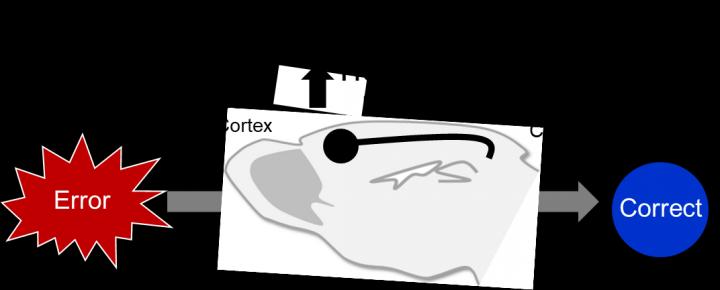
Credit: Mount Sinai Health System
Mount Sinai researchers have identified a neural pathway through which the brain detects errors and guides subsequent behavioral improvement. This process, called cognitive control, is frequently dysregulated in a wide range of psychiatric disorders. The team’s research, published February 19 in Neuron, also suggests that neurostimulation of this brain pathway could provide an important mechanism for attention adjustments following behavioral errors.
When errors are committed, such as missing a stop sign or running a red light while driving, it’s important for our survival to immediately adapt behavior by paying more attention to prevent further errors. This ability to adapt behavior after erroneous actions is one of the key components of human cognitive control.
“Deficits in error monitoring and attentional function are common to many psychiatric problems, including schizophrenia, ADHD, and autism spectrum disorder, but little is known about the specific neural pathways that are linking these processes,” says senior author Hirofumi Morishita, MD, PhD, Associate Professor of Psychiatry, Neuroscience, and Ophthalmology, and a faculty member of The Friedman Brain Institute and the Mindich Child Health and Development Institute at the Icahn School of Medicine at Mount Sinai. “Our study, conducted in mice and led by Kevin Norman, a graduate student in our laboratory, represents the first demonstration of a specific circuit mechanism linking error-monitoring and attentional adjustment, two fundamental components of cognitive control systems in humans.”
The neural basis of cognitive control has been a hotly debated topic within neuroscience, with a host of neuroimaging studies showing that parts of the frontal cortex, which is pivotal to planning appropriate behavioral responses to external and internal stimuli, are essential for error monitoring.
The new Mount Sinai study took that finding an important step further. In a series of experiments with mice, allowing for deployment of a full suite of neuroscience techniques not possible in humans, the researchers discovered a specific neural pathway originating in the frontal cortex that is engaged during a key aspect of cognitive control.
Specifically, they learned that task-related errors recruit frontal neurons that project signals onto the visual cortex, which processes visual information from the eye, and that this post-error activation is essential for improving subsequent behavioral performance.
“Frontal projections to visual areas are important for attention modulation of visual processing,” explains Dr. Morishita. “Put another way, we showed that direct and specific frontal sensory projections are key pathways for linking past errors to cognitive control mechanisms that promote attention.”
Beyond its enhanced mapping of the neural circuit and function, the Mount Sinai study could have major implications for clinical treatment. The team employed a technique known as optogenetic stimulation, a biological process that employs a combination of genetic and light techniques to control the activities of individual neurons to selectively stimulate the frontal projections to the visual cortex. By employing this technique, the researchers were able to improve attention in these mice once light pulses were administered to them after errors. The specific cortical pathway identified in this study could potentially be modulated using techniques like transcranial magnetic stimulation and/or transcranial direct current stimulation to improve post-error attentional adjustments in many of the most common types of psychiatric disorders.
“On a larger scale, our findings resolve the conflicts among recent studies reporting mixed contributions of frontal-sensory circuits to attentional behavior by suggesting that this circuit is only recruited under certain conditions, namely following task-related errors,” says Dr. Morishita. “For that reason, we believe our research will have broad interest and impact the fields of neuroscience, psychology, psychiatry, and neurology, while informing neuroscience-based computational models of cognition.”
###
About the Mount Sinai Health System
The Mount Sinai Health System is New York City’s largest academic medical system, encompassing eight hospitals, a leading medical school, and a vast network of ambulatory practices throughout the greater New York region. Mount Sinai is a national and international source of unrivaled education, translational research and discovery, and collaborative clinical leadership ensuring that we deliver the highest quality care–from prevention to treatment of the most serious and complex human diseases. The Health System includes more than 7,200 physicians and features a robust and continually expanding network of multispecialty services, including more than 400 ambulatory practice locations throughout the five boroughs of New York City, Westchester, and Long Island. The Mount Sinai Hospital is ranked No. 14 on U.S. News & World Report‘s “Honor Roll” of the Top 20 Best Hospitals in the country and the Icahn School of Medicine as one of the Top 20 Best Medical Schools in country. Mount Sinai Health System hospitals are consistently ranked regionally by specialty and our physicians in the top 1% of all physicians nationally by U.S. News & World Report.
For more information, visit https:/
Media Contact
Elizabeth Dowling
[email protected]
Original Source
https:/




